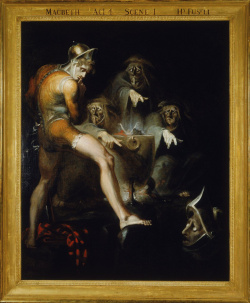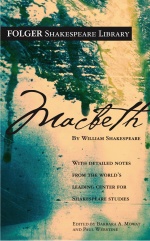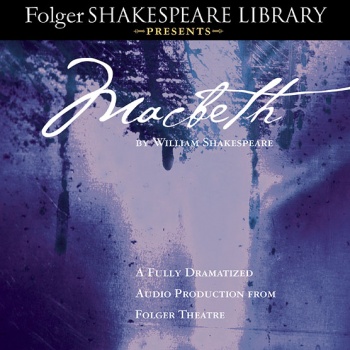Macbeth
This article is about Shakespeare's play. For other uses, see Macbeth (disambiguation).

In 1603, James VI of Scotland ascended the English throne, becoming James I of England. London was alive with an interest in all things Scottish, and Shakespeare turned to Scottish history for material. He found a spectacle of violence and stories of traitors advised by witches and wizards, echoing James's belief in a connection between treason and witchcraft.
In depicting a man who murders to become king, Macbeth, one of William Shakespeare's plays, teases us with huge questions. Is Macbeth tempted by fate, or by his or his wife's ambition? Why does their success turn to ashes?
Like other plays, Macbeth speaks to each generation. Its story was once seen as that of a hero who commits an evil act and pays an enormous price. Recently, it has been applied to nations that overreach themselves and to modern alienation. The line is blurred between Macbeth's evil and this opponents' good, and there are new attitudes toward both witchcraft and gender.
Shakespeare wrote Macbeth in about 1606 or 1607. It was published in the 1623 First Folio.[1]
Productions at the Folger
- Helen Hayes Awards
- Nominations: "Outstanding Resident Play," "Outstanding Sound Design, Resident Production" for Karing Graybash and Kenny Wollesen, and "Outstanding Director, Resident Play" for Teller and Aaron Posner
- Helen Hayes Awards
- Nominations: "Outstanding Lead Actress, Resident Play" for Lucy Newman-Williams and "Outstanding Lighting Design, Resident Play or Musical" for Dan Covey
Early editions
First Folio
- LUNA: First Folio: 2l6r - 2n4r
- Hamnet: STC 22273 Fo. 1 no. 68
Second Folio
- LUNA: Second Folio: 2n4r - 2p2r
- Hamnet: STC 22274 Fo. 2 no. 07
Modern editions
Macbeth can be read online with Folger Digital Texts and purchased from Simon and Schuster.
Hamnet link to Folger Edition: PR2753 .M6 2004 copy 2 v.21
In popular culture
Translations
The Folger owns almost 120 stand-alone translations of Macbeth in various languages (not including collected works). Cataloging of these works is ongoing as of early 2015, and many have full-level catalog records, but some works still have only partial records. Translations can be found Hamnet in by searching for "Translations"in the Genre/Form Term field, or by searching the Call Number (Left-Anchored) field for call numbers starting with PR2796 (see the list of Sh.Col. translations call numbers for specific language call numbers). Since not all translations are fully cataloged, some items may only turn up in one of these searches.
Performance materials
Other media
Audio edition
Macbeth Audio Edition from Simon & Schuster available on CD and as an audio download.
| CAST | |
|---|---|
| Macbeth | Ian Merrill Peakes |
| Lady Macbeth | Rachael Holmes |
| Duncan | Eric Hissom |
| Macduff | Cody Nickell |
| Lady Macduff | Karen Peakes |
| Malcolm | Aubrey Deeker |
| Banquo | Richard Sheridan Willis |
| Ross | Chris Genebach |
| Captain | Louis Butelli |
| Lennox | Todd Scofield |
Other parts were played by members of the cast.
Directed by Robert Richmond.
Original music composed by Jessica Witchger.
In partnership with Simon & Schuster Audio
Audio
Listen to this Folger podcast that offers an introduction to the play via Folger actors and directors.
Image Group
Explore the curated image group for Macbeth' in the Folger digital image collection.
Content Advisory: this image group contains representations of blood.
Video
Hear Barbara Mowat, co-editor of the Folger Shakespeare Library editions, discuss the problems she faced while editing Macbeth.
Listen to Mowat talk about her approach to word choice and spelling issues in the play.
Below, Mowat discusses the different names for the three mysterious beings whose prophecies set the play in motion.
Notes
- ↑ Adapted from the Folger Library Shakespeare edition, edited by Barbara A. Mowat and Paul Werstine. © 1992 Folger Shakespeare Library.



